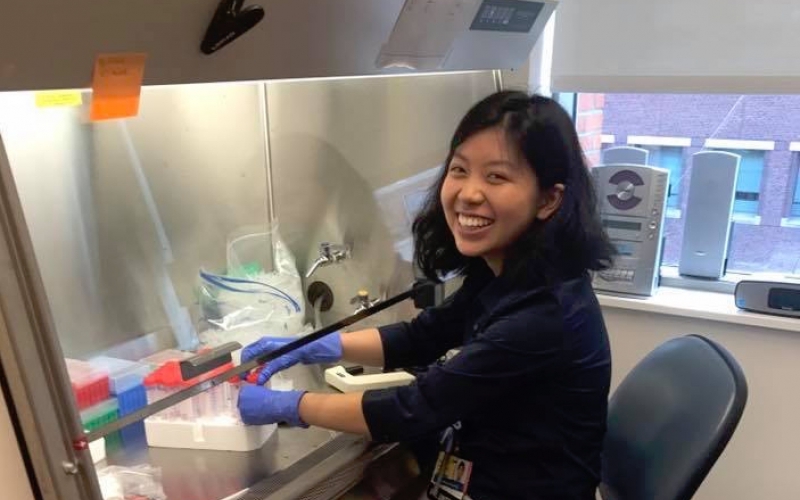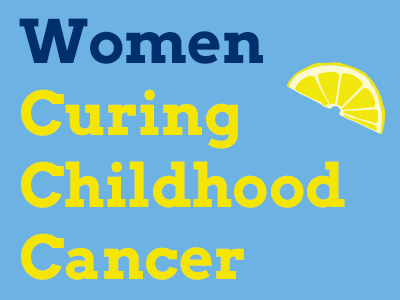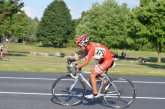
by Trish Adkins, ALSF
For as long as she can remember Sabrina Wang, a student at Johns Hopkins University in Maryland, wanted to be a scientist. As an undergraduate student, Sabrina received a 2016 Pediatric Oncology Student Training (POST) grant from Alex’s Lemonade Stand Foundation (ALSF) to work with Drs. Eric Raabe, Charles Eberhart and Jeffrey Rubens at Johns Hopkins.
Sabrina spent the summer working in the lab, learning and studying atypical teratoid/rhabdoid tumor (AT/RT), a very rare, fast-growing tumor that typically starts in the brain, kidneys, spinal cord or other soft tissues of the body. About half of these tumors occur in the cerebellum, the part of the brain that controls movement and balance or in the brain stem, the part of the brain that controls essential life functions like breathing, blood pressure and heart rate. Sabrina’s work focused specifically on MYC-driven AT/RT. MYC is a gene that drives the growth of some cancer cells.
Part of her research work also involved the ability to see the clinical side of research and the tangible impact of research on the lives of real patients. 
Sabrina entered the undergraduate student competition at the American Association for Cancer Research (AACR) with a poster based on her POST grant work—and she won the top prize beating out several hundred entries.
Now, Sabrina is continuing her pediatric oncology education and career as a research technologist—focusing on gathering, cataloging and organizing data—with Dr. Rubens at Johns Hopkins. We spoke with Sabrina about her research interests and her future goals:
What made you want to get into science and research?
(SW)When I was 10 years old, I wanted to be a scientist and a pianist. I couldn’t decide between the two.
I have always wanted to be in medicine for as long as I can remember, but it actually wasn’t until I received the POST award two years ago, worked in Dr. Raabe’s lab, and experienced my first research conference that I could really see myself pursuing both research and medicine as part of my future career.
What are obstacles that you have faced?
(SW) I am incredibly lucky to be surrounded by supportive people who have helped me overcome any hurdles that pass my way.
If we’re talking literal obstacles, I’d say that 85% of all lab furniture is at an awkwardly tall height for me. I have never been able to see the inside of an over-the-range microwave.
Who are your role models?
(SW) Oh, definitely my mentors – Dr. Raabe and Dr. Rubens – for showing me the possibility of what I can pursue in my future and for always pushing me forward. I’m their biggest fan. They’ve lead by example on how to integrate science and medicine together, how to balance research, patients, and family life while being tremendously gracious (also known as, ridiculously perfect). Since I’ve been at the Baltimore campus, Dr. Leana Wen has been someone who I aspire to be in the future – her drive and compassion are qualities I try to emulate as well. And growing up, Anne of Green Gables was my literary heroine. (I, too, tried to cram as many long words as possible everywhere.)
If cancer was cured, what would you be doing?
(SW) Most likely painting and baking lots of sourdough! (But I would definitely still be in science.)
Was there a moment when you felt the impact your research might have on curing childhood cancer?
(SW) The “a-ha” moment for me happened during my second day of shadowing in the clinic. My mentor asked a parent how a standard chemotherapy treatment had gone. Coincidentally, the treatment was also a drug I had investigated in the lab, and the connection between research and what it meant for patients suddenly fell into place for me. It’s something I often read about in literature, but to actually experience the “click” was quite surreal.
 In honor of International Women’s Day on March 8 and Women’s History month, ALSF will feature interviews with some of our outstanding funded women researchers on the ALSF blog. You can follow along here.
In honor of International Women’s Day on March 8 and Women’s History month, ALSF will feature interviews with some of our outstanding funded women researchers on the ALSF blog. You can follow along here.

